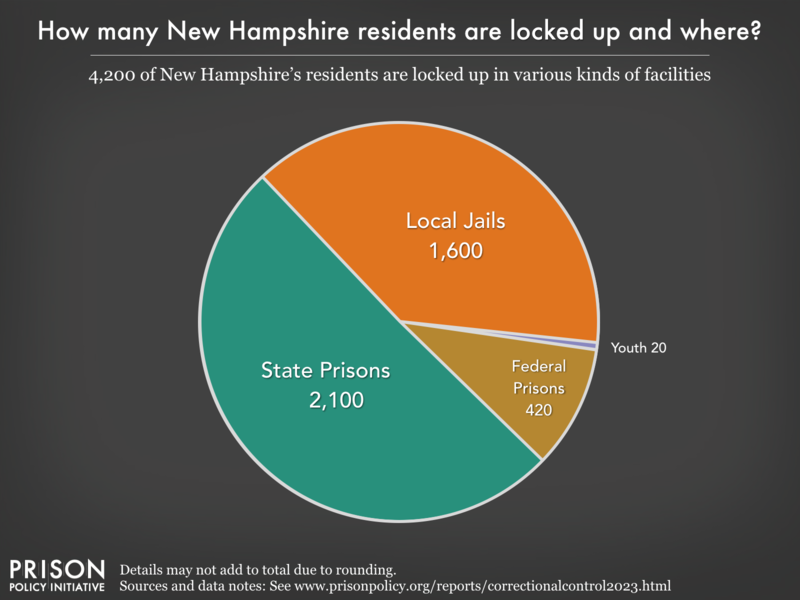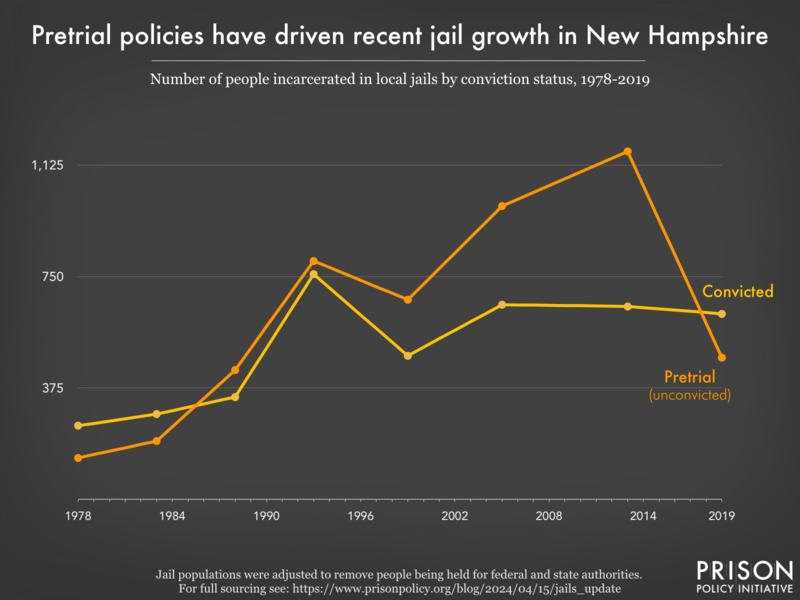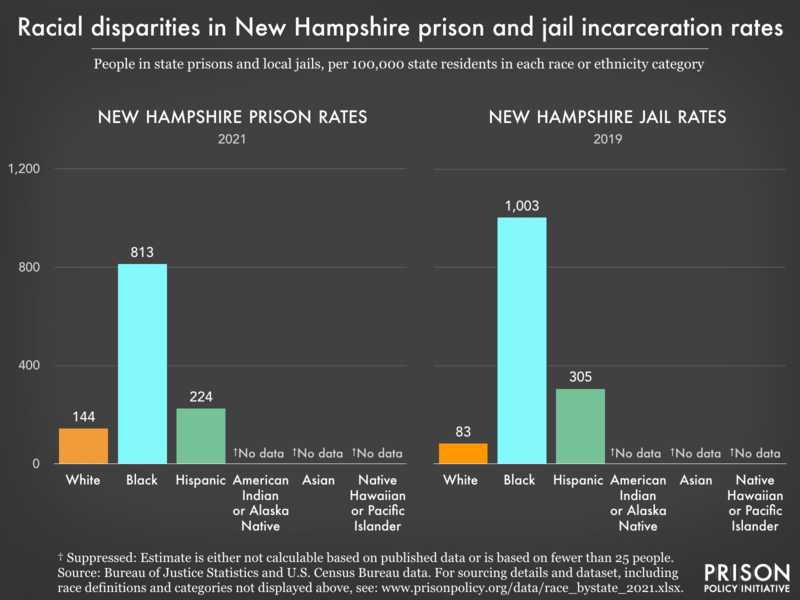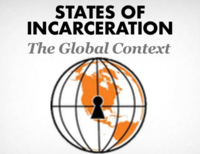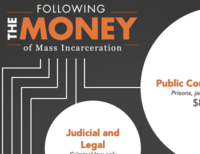Thank you,
—Peter Wagner, Executive Director
Donate
New Hampshire profile
New Hampshire has an incarceration rate of 278 (including prisons, jails, immigration detention, and juvenile justice facilities), meaning that it locks up a higher percentage of its people than almost any democratic country on earth. Read on to learn more about who is incarcerated in New Hampshire and why.
4,200 people from New Hampshire are behind bars
Additionally, the number of people impacted by county and city jails in New Hampshire is much larger than the graph above would suggest, because people cycle through local jails relatively quickly. Each year, at least 25,000 different people are booked into local jails in New Hampshire.
Rates of imprisonment have grown dramatically in the last 40 years
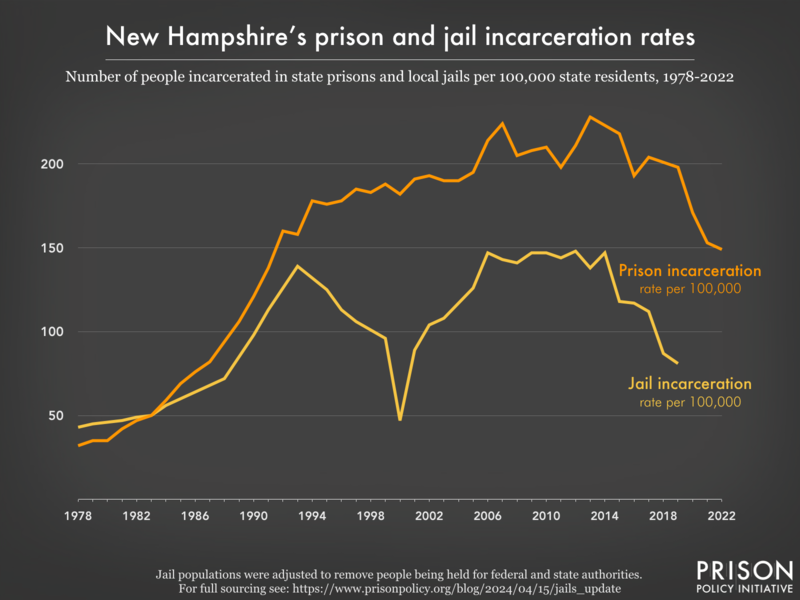
- total numbers rather than rates.
- Women’s prisons: Incarceration Rates | Total Population
- Men’s prisons: Incarceration Rates | Total Population
Today, New Hampshire’s incarceration rates stand out internationally

People of color are overrepresented in prisons and jails
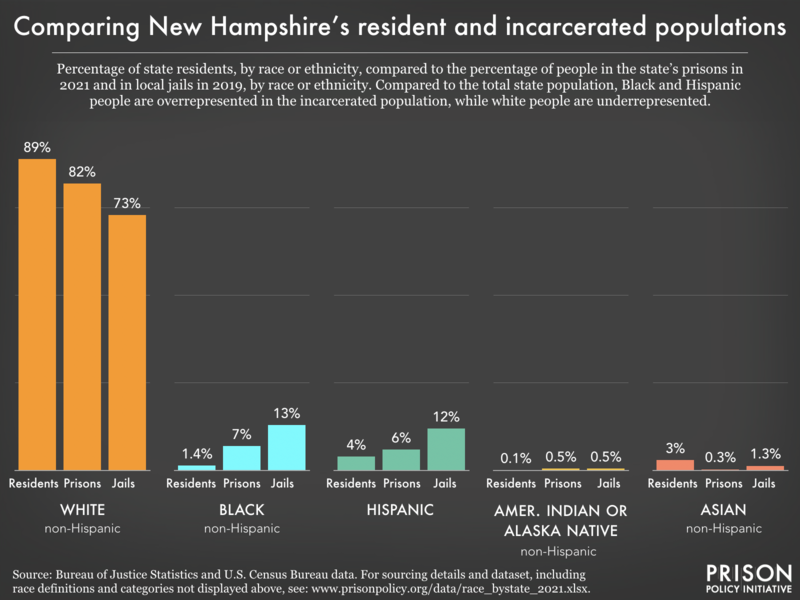
New Hampshire's criminal justice system is more than just its prisons and jails
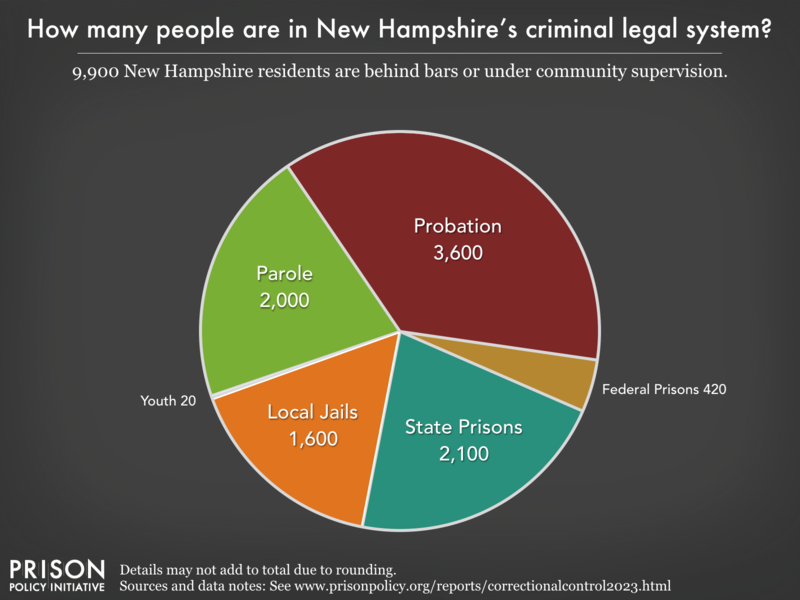
Reports and briefings about New Hampshire's criminal legal system:
Filter to show
- People on probation in New Hampshire are saddled with onerous rules and conditions they must follow every day or risk incarceration.
- Prisons in New Hampshire have tablets, but they may be being used to restrict incarcerated people’s access to books and sap them of the little money they have.
- With an incarceration rate of 278 per 100,000 residents, New Hampshire locks up a higher percentage of its people than almost any democratic country on earth.
- 43% of people in New Hampshire jails have not been convicted of a crime, meaning they're legally innocent. There are simple steps the state can take to reduce this number. Why isn't it?
- New Hampshire releases roughly 18,159 men and 5,607 women from its prisons and jails each year. What is it doing to support them upon reentry?
- New Hampshire is home to the worst prison gerrymanders in the nation.
- People on parole in New Hampshire can be sent back to prison for "associating" with anyone who has a felony conviction — even loved ones who are trying to support them
- Black people in New Hampshire are incarcerated at a rate 5.7 times higher than white people.
- New Hampshire's choice to criminalize "failure to appear" may be hurting public safety
- The cost of incarcerating older people is incredibly high, and their risk of reincarceration is incredibly low, yet 14% of people in New Hampshire prisons are over the age of 55. Why is the state keeping so many older people locked up?
- Prisons in Northeastern states, like New Hampshire, have seen the greatest increase in deaths during heatwaves.
- New Hampshire makes it difficult or even risky for incarcerated journalists to tell their stories.
- New Hampshire is one of 20 states that locks up some people convicted of sex offenses in shadowy "civil commitment" facilities, long after their sentences are over — and often indefinitely.
- In New Hampshire, 4,200 people are incarcerated and another 5,600 are on probation or parole.
- New Hampshire charges up to 40¢ for an e-message to or from prison, among the highest rates in the nation.
- Jails in New Hampshire charge up to $3.15 for a 15-minute phone call, reaping profits for companies, while prisons charge 20¢ for a 15-minute call.
- Bail companies in New Hampshire have a track record of avoiding accountability, our report All Profit, No Risk and review of state-by-state evidence show
- New Hampshire granted extremely few commutations to incarcerated people in recent years, and granted zero commutations during COVID-19
- New Hampshire suspended its $3 medical copays in prisons at the beginning of the pandemic for flu related medical visits — but should eliminate them completely.
- People in New Hampshire prisons must pay for hygiene items and other basics regardless of whether they can afford it.
- New Hampshire prisons and GTL don't report data on fees to transfer money to an incarcerated loved one.
- We gave New Hampshire a failing grade in September 2021 for its response to the coronavirus in prisons.
- New Hampshire hurts jury diversity by excluding people with felony records
- How many COVID-19 cases in New Hampshire communities can be linked to outbreaks in correctional facilities? (data from our report Mass Incarceration, COVID-19, and Community Spread)
- We graded the parole release systems of all 50 states — New Hampshire gets a D-
- New Hampshire incarcerates women at a rate of 83 per 100,000 residents — higher than almost any democratic country on earth.
- People in New Hampshire prisons earn as little as 25¢ an hour for their work.
Other resources
- Research on New Hampshire in our Research Library
